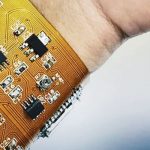 Wearable devices are becoming increasingly powerful, but one of the more interesting devices to come out of research labs in recent years has emerged from a team at Rutgers University-New Brunswick. They’ve developed a wristband that can monitor your personal health and even levels of environmental exposure.
Wearable devices are becoming increasingly powerful, but one of the more interesting devices to come out of research labs in recent years has emerged from a team at Rutgers University-New Brunswick. They’ve developed a wristband that can monitor your personal health and even levels of environmental exposure.
The work, which was documented in a recently published paper, connects to smartphones via a wireless connection, and the team believe it could be incorporated into other wrist-based devices, such as smart watches.
“It’s like a Fitbit but has a biosensor that can count particles, so that includes blood cells, bacteria, and organic or inorganic particles in the air,” they explain.
Enhanced wearables
Whilst wearable technology is advancing at quite a pace, the team believe that those on the market today are largely only capable of monitoring for a handful of physical parameters, which usually cover things like heart rate and exercise activity. They believe that being able to monitor for things such as the number of cells in our bloodstream takes things to a whole new level.
The wristband uses similar technology to that mentioned in a post from last year, with a flexible circuit board containing a biosensor with gold electrodes embedded inside. The circuit processes electrical signals, whilst a micro-controller digitizes the data that is then transmitted wirelessly via a Bluetooth module.
The researchers say that pinpricks can be used to obtain blood samples that are then transmitted through the device in order for blood cells to be counted. This data is then sent to an app on any Android or Apple-based smartphone.
They believe it could enable health professionals to secure rapid blood tests from patients without needing bulky and expensive equipment. The blood cell counts can be used to diagnose a range of illnesses.
“There’s a whole range of diseases where blood cell counts are very important,” they explain. “Abnormally high or low white blood cell counts are indicators of certain cancers like leukemia, for example.”
They believe that devices like this could easily empower patients to continuously monitor their health, with the data sent to their doctor remotely, with this power especially useful for people working in hazardous conditions.
“This would be really important for settings with lots of air pollutants and people want to measure the amount of tiny particles or dust they’re exposed to day in and day out,” they say. “Miners, for example, could sample the environment they’re in.”